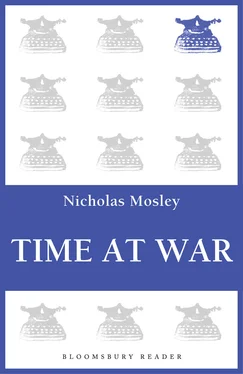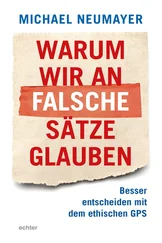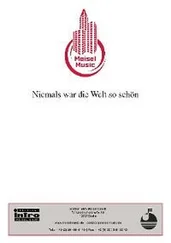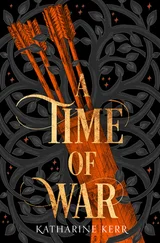This was now the second week in April 1945. For the advance across the promised land of the Po valley and the northern plain we were for the first time since Cassino a year ago going to work with tanks and the support of heavy artillery; also now there would be fighter-bombers overhead ready to be called up to deal with opposition if it became serious. The tank regiment we were going to work with was the fashionable 9th Lancers, with two or three of whose officers I had been at school. We eyed one another warily: what on earth was I doing with the London Irish Rifles? Once I would have thought — But I’m not ‘with’ anyone. Now I was rather pleased to be seen as being allied to something unfashionable.
The Irish Brigade was set to advance through something called the Argenta Gap — a stretch of artificially drained land at the eastern end of the Po valley, which lay between areas that had been flooded. The Fusiliers and Inniskillings were to make the initial breakthrough across the Senio and Santerno rivers; then the London Irish were to exploit this, working in teams with tanks — one troop of tanks to each platoon. The infantry were to be carried in armoured personnel carriers known as Kangaroos — three to a platoon — consisting of the bodies of tanks or self-propelled guns with the turrets or armaments removed. When the going was straightforward the tanks would go ahead and be in charge; when they came across anti-tank opposition they would stop and give covering fire while the infantry dismounted and took charge and did a textbook attack on foot. With luck, we were told, the enemy would surrender.
This was my first experience of what might be called the heroic aspect of war — the sort of thing Germans must have experienced in Poland and France in 1939 and 1940 and in the earliest days of the Russian campaign: tanks rolling across flat country and people emerging with their hands up and what little opposition there was being dive-bombed while those in tanks could watch as if at an air show. Here in Italy people came out from villages and farmsteads with flowers and bottles of wine and the offer of kisses. In the fields there was the occasional German tank now burning and with a body perhaps hanging like a rag doll from the turret.
It was not, of course, always like this. Once a neighbouring Kangaroo was hit by an anti-tank shell and the people in my carrier were showered with bits of blood and bone. Then there were the times when we were on foot again and doing our training-ground attacks — ‘One and two sections round on the right, three section give covering fire!’ But more often than not, yes, when we got to our objective the enemy had disappeared. With us gaining in confidence I could even try out a more democratic form of leadership, about the feasibility of which I had wondered. Once, when the tanks had been held up by some anti-tank fire from a farmstead and I had ordered — ‘Dismount! We’ll go round by that ditch’, a voice from my platoon piped up — ‘Sir, wouldn’t it be better if we went round in the carriers as far as that clump of trees and then dismounted?’ And I saw the sense of this, so I shouted — ‘You’re absolutely right! Everyone back in the carriers!’ And by the time we eventually got to our objective the enemy was indeed pulling out. My platoon seemed to appreciate this readiness to change one’s mind, though it would probably only have worked in a war as good as won.
There was a constant problem with prisoners. As we advanced from Argenta towards Ferrara, more and more Germans were waiting for us with their hands up. We could not easily spare the men to escort them back, yet the time had not come when we could leave them to their own devices. On the second or third day of our advance the tank major who was nominally in command of our infantry platoon told us, when given out his daily orders, that we were taking too many prisoners. He repeated — Did we understand? We were taking too many prisoners. One of us, probably Desmond Fay, quietly spat on the ground. And we went on taking too many prisoners.
In Richard Doherty’s History of the Irish Brigade the story of this advance is one of strategies and deployments of forces: this many regiments of field artillery here; that number of specially equipped tanks for crossing ditches and clearing mines there; such and such squadrons of planes on call overhead in what was called a ‘cab-rank’. The plans and orders were precise; also what could be said to have succeeded and what could not. But there was not much need to talk of failure. Instead, there were statistics: the Irish Brigade had taken prisoner ‘twenty-two officers and 2,000 other ranks’; casualties inflicted had been ‘far greater’; ‘seven mark IV German tanks were knocked out by the 9th Lancers for the loss of only one of their own’. From what I could see I did not think that there were many casualties on either side: certainly not on ours, apart from those in the carrier that had been hit. But what stays in my memory, as at Cassino, was the impression that no individual could know much of what was going on; one had to wait and see when it was over. But here it could indeed be felt that things were going well, and I began to think I understood something of what those ghastly Nazi armies must have felt as they bludgeoned their way smiling across Poland, France, Russia; until nemesis caught up with them and the homes they had left behind were utterly flattened, and there was no heroic ideology for them to come back to. I wrote to my father –
It is a happier form of warfare than any we have done before, but I find it exhibits the most unfortunate characteristics of one’s nature. I actually find this conquest and pursuit faintly enjoyable — and at last understand the fatal temptation of aggression. But nevertheless it is for the most part tedious, and I am irked by the feeling that the end ever remains the same distance from us even as we advance.
However, there came a day early in May when we were on the outskirts of Ferrara and the crowds coming out with flowers were even more ebullient than usual, and the bangs and whooshes that could be heard were of fireworks rather than grenades or Moaning Minnies; and the German trenches we were occupying were deserted except for a litter of old love letters and a smell of stale bread. And the German radio was playing Wagner — the ‘Entry of the Gods into Valhalla’, I think— and it dawned on us that our war was over. Some of those I was with said later that they almost immediately began to feel strangely at a loss: for so long the war had provided a structure for their lives; a means of getting on with things in spite of doubts and fears. This feeling seemed to persist. However, I took the opportunity to borrow a jeep and drive into Ferrara to have a look at its fourteenth-century castle — a massive turreted building with reddish walls and a moat with drawbridges. This was a monument to war now to be preserved for tourists. And as an adjunct to triumphalism, there was the promise of loot.
When the Germans began to surrender en masse on 2 May, and were rounded up and carted off to prison camps, they had to leave behind … everything. The sides of the roads were littered with both the large-scale and the personal detritus of war — tanks, trucks, heavy guns; but also, in piles, abandoned personal weapons and possessions. We searched through these for what trophies we might pick out — in particular the prized Luger pistol. I took my fill of pistols and even a shotgun or two; and then I came cross a small and pretty piano accordion — on which quite soon I learned to play the rousing and sentimental Neapolitan songs that had seemed so much part of our war. Also one’s platoon could now be fitted out with its own means of transport. I wrote to my sister –
Читать дальше












